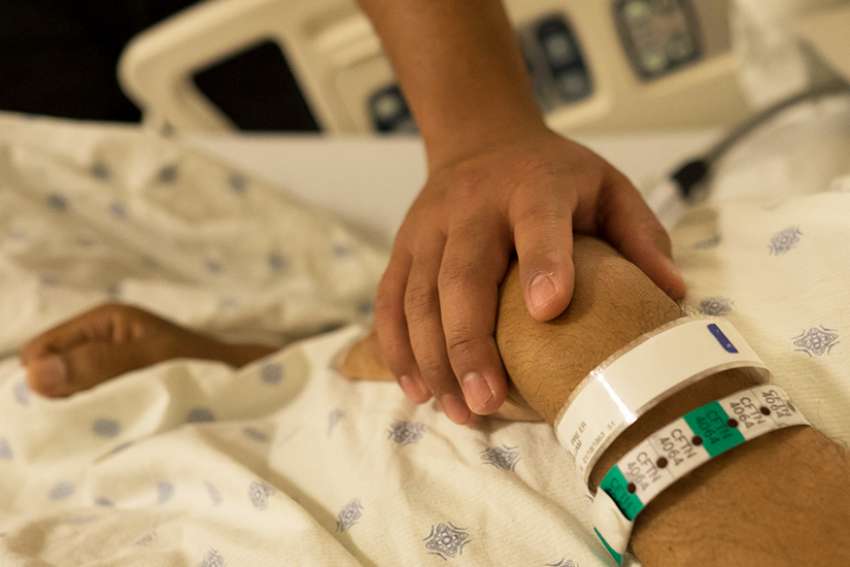Hand of seminarian William Carmona in an intensive care room at Christus Santa Rosa Medical Center in San Antonio Sept. 7, 2014.
CNS photo/Rick Musacchio, Tennessee Register
Dying without a Will creates many issues
By Amanda Stacey, Catholic Register Special
If you die without a Will, you are considered to have died “intestate.” While dying intestate does not mean your estate goes to the government, it does mean that you lose the ability to decide who will benefit from, and manage, your estate.
Dying intestate creates unnecessary delays and additional expenses for the estate. When an individual dies intestate, their assets are divided in accordance with the laws of the province in which they resided immediately before death. This is done by involving one or more individuals, often family members, to administer and wind up the estate.
To enable these individuals to administer and distribute the deceased’s estate, a grant of “probate” or “administration” must be applied for and obtained from a court in the deceased’s jurisdiction. This grant serves as conclusive evidence that the individuals to whom the grant is given have the right to administer the estate.
In all Canadian provinces, if the deceased did not have children, the surviving spouse, if applicable, will receive the entire estate. If the deceased had children, then depending on the province in which the deceased resided immediately before death, the surviving spouse will receive a preferential share of the estate and the balance will be divided among the surviving spouse and children.
In Ontario, the Succession Law Reform Act sets out how an estate is distributed when a person dies intestate. If the deceased died with a surviving spouse and one child, the first $200,000 is distributed to the spouse and the remainder of the estate is divided evenly between the spouse and the child. If the deceased died with a surviving spouse and more than one child, the first $200,000 is distributed to the spouse, and one-third of the remainder of the estate is distributed to the spouse and two-thirds of the remainder of the estate is divided among the children equally.
Situations where the children of an intestate testator are under the age of majority are particularly problematic because a minor cannot inherit property. In these circumstances, the minor’s funds will be held by The Office of the Children’s Lawyer until he or she reaches the age of 18. Thus, not having a Will results in a young person inheriting property at an earlier age than might otherwise be desired, and the funds are held up until that minor reaches the age of 18. Another responsible individual can manage the funds on behalf of the minor in place of the Children’s Lawyer, but that responsible individual must first make a court application to become the minor’s guardian for property.
The rules applicable on intestacy often do not reflect the personal wishes of the deceased. One interesting point is that the definition of “spouse” varies from province to province, which may give rise to difficulties for non-traditional families. Most provinces do not recognize common-law spouses as spouses for inheritance purposes on intestacy. The only recourse for a common-law spouse who is left out on an intestacy is to petition the court for support as a dependent. However, this places additional costs on the estate.
A Power of Attorney (POA) is a written document in which an individual appoints someone to act on their behalf concerning financial and/or personal care matters in the event that they become incapable. If a POA is not in place, there is no one with authority to manage the incapable person’s finances and/or personal care on their behalf.
In Ontario, there are two types of Powers of Attorney: the Continuing Power of Attorney for Property and the Power of Attorney for Personal Care. Without a POA, particularly with respect to an individual’s finances, it will often be necessary for one or more individuals to make a court application to be appointed as the incapable individual’s guardian for property and personal care.
Thus, not having proper Powers of Attorney in place results in added time and costs in dealing with your affairs. It also takes the decision about who will manage one’s affairs in these circumstances out of your hands.
(Stacey is a partner with Miller Thomson LLP and has a tax, estates and trusts practice that provides advice to individuals and families. She also provides both general counsel and tax advice to charities and not-for-profit organizations.)
Please support The Catholic Register
Unlike many media companies, The Catholic Register has never charged readers for access to the news and information on our website. We want to keep our award-winning journalism as widely available as possible. But we need your help.
For more than 125 years, The Register has been a trusted source of faith-based journalism. By making even a small donation you help ensure our future as an important voice in the Catholic Church. If you support the mission of Catholic journalism, please donate today. Thank you.
DONATE

